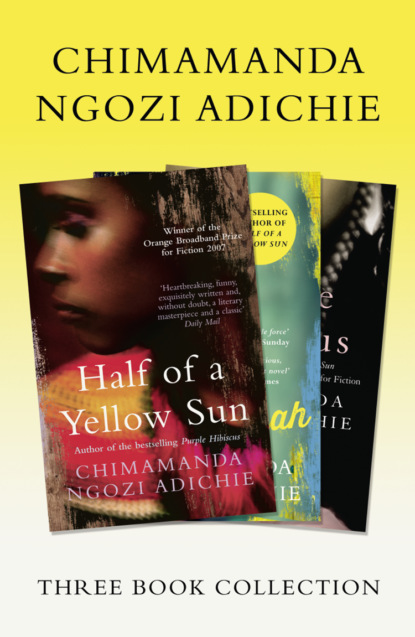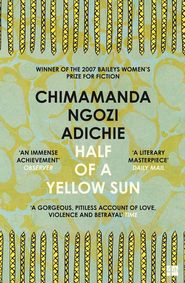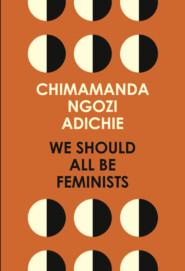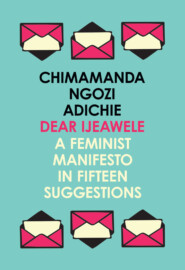По всем вопросам обращайтесь на: info@litportal.ru
(©) 2003-2024.
✖
Half of a Yellow Sun, Americanah, Purple Hibiscus: Chimamanda Ngozi Adichie Three-Book Collection
Автор
Год написания книги
2018
Настройки чтения
Размер шрифта
Высота строк
Поля
‘You see, Ugwu? A boy does not belong in the kitchen.’ Master’s mother sounded triumphant. She was standing by the counter, already breaking up some dried fish, extracting the needlelike bones.
‘Yes, Mama.’ Ugwu was surprised that she had not asked for a glass of water or gone inside to change first. He sat on the stool and waited for her to tell him what to do. It was what she wanted; he could sense that. She was looking over the kitchen now. She peered suspiciously at the stove, knocked on the pressure cooker, tapped the pots with her fingers.
‘Eh! My son wastes money on these expensive things,’ she said. ‘Do you not see, Amala?’
‘Yes, Mama,’ Amala said.
‘Those belong to my madam, Mama. She brought many things from Lagos,’ Ugwu said. It irritated him: her assuming that everything belonged to Master, her taking command of his kitchen, her ignoring his perfect jollof rice and chicken.
Master’s mother did not respond. ‘Amala, come and prepare the cocoyams,’ she said.
‘Yes, Mama.’ Amala put the cocoyams in a pot and then looked helplessly at the stove.
‘Ugwu, light the fire for her. We are village people who only know firewood!’ Master’s mother said, with a short laugh.
Neither Ugwu nor Amala laughed. Ugwu turned the stove on. Master’s mother threw a piece of dried fish into her mouth. ‘Put some water to boil for me, Ugwu, and then cut these ugu leaves for the soup.’
‘Yes, Mama.’
‘Is there a sharp knife in this house?’
‘Yes, Mama.’
‘Use it and slice the ugu well.’
‘Yes, Mama.’
Ugwu settled down with a cutting board. He knew she was watching him. When he started to slice the fibrous pumpkin leaves, she yelped, ‘Oh! Oh! Is this how you cut ugu? Alu melu! Make them smaller! The way you are doing it, we might as well cook the soup with the whole leaves.’
‘Yes, Mama.’ Ugwu began slicing the leaves in strips so thin they would break up in the soup.
‘That’s better,’ Master’s mother said. ‘You see why boys have no business in the kitchen? You cannot even slice ugu well.’
Ugwu wanted to say, Of course I slice ugu well. I do many things in the kitchen better than you do, but instead he said, ‘My madam and I don’t slice vegetables, we shred them with our hands because the nutrients come out better that way.’
‘Your madam?’ Master’s mother paused. It was as if she wanted to say something but held herself back. The steam from boiling hung in the air. ‘Show Amala the mortar so she can pound the cocoyams,’ she said finally.
‘Yes, Mama.’ Ugwu rolled out the wood mortar from under the table and was rinsing it when Olanna came home. She appeared at the kitchen door; her dress was smart-fitting, her smiling face was full of light.
‘Mama!’ she said. ‘Welcome, nno. I am Olanna. Did you go well?’ She reached out to hug Master’s mother. Her arms went round to enclose the older woman but Master’s mother kept her hands to her sides and did not hug Olanna back.
‘Yes, our journey went well,’ she said.
‘Good afternoon,’ Amala said.
‘Welcome.’ Olanna hugged Amala briefly before turning to Master’s mother. ‘Is this Odenigbo’s relative from home, Mama?’
‘Amala helps me in the house,’ Master’s mother said. She had turned her back to Olanna and was stirring the soup.
‘Mama, come, let’s sit down. Bia nodu ana. You should not bother in the kitchen. You should rest. Let Ugwu do it.’
‘I want to cook a proper soup for my son.’
There was a light pause before Olanna said, ‘Of course, Mama.’ Her Igbo had slipped into the dialect that Ugwu heard in Master’s speech when his cousins visited. She walked around the kitchen, as if eager to do something to please Master’s mother but uncertain what to do. She opened the pot of rice and closed it. ‘At least let me help you, Mama. I’ll go and change.’
‘I hear you did not suck your mother’s breasts,’ Master’s mother said.
Olanna stopped. ‘What?’
‘They say you did not suck your mother’s breasts.’ Master’s mother turned to look at Olanna. ‘Please go back and tell those who sent you that you did not find my son. Tell your fellow witches that you did not see him.’
Olanna stared at her. Master’s mother’s voice rose, as if Olanna’s continued silence had driven her to shouting. ‘Did you hear me? Tell them that nobody’s medicine will work on my son. He will not marry an abnormal woman, unless you kill me first. Only over my dead body!’ Master’s mother clapped her hands, then hooted and slapped her palm across her mouth so that the sound echoed.
‘Mama –’ Olanna said.
‘Don’t mama me,’ Master’s mother said. ‘I said, Do not mama me. Just leave my son alone. Tell your fellow witches that you did not find him!’ She opened the back door and went outside and shouted. ‘Neighbours! There is a witch in my son’s house! Neighbours!’ Her voice was shrill. Ugwu wanted to gag her, to stuff sliced vegetables into her mouth. The soup was burning.
‘Mah? Will you stay in the room?’ he asked, moving towards Olanna.
Olanna seemed to get hold of herself. She tucked a plait behind her ear, picked up her bag from the table, and headed for the front door. ‘Tell your master I have gone to my flat,’ she said.
Ugwu followed her and watched as she got into her car and drove out. She did not wave. The yard was still; there were no butterflies flitting among the white flowers. Back in the kitchen, Ugwu was surprised to hear Master’s mother singing a gently melodious church song: Nya nya oya mu ga-ana. Na m metu onu uwe ya aka ….
She stopped singing and cleared her throat. ‘Where has that woman gone?’
‘I don’t know, Mama,’ Ugwu said. He walked over to the sink and began to put away the clean plates in the cupboard. He hated the too-strong aroma of her soup that filled the kitchen; the first thing he would do after she left was wash all the curtains because that smell would soak into them.
‘This is why I came. They said she is controlling my son,’ Master’s mother said, stirring the soup. ‘No wonder my son has not married while his mates are counting how many children they have. She has used her witchcraft to hold him. I heard her father came from a family of lazy beggars in Umunnachi until he got a job as a tax collector and stole from hard-working people. Now he has opened many businesses and is walking around in Lagos and answering a Big Man. Her mother is no better. What woman brings another person to breastfeed her own children when she herself is alive and well? Is that normal, gbo, Amala?’
‘No, Mama.’ Amala’s eyes focused on the floor as if she were tracing patterns on it.
‘I heard that all the time she was growing up, it was servants who wiped her ike when she finished shitting. And on top of it, her parents sent her to university. Why? Too much schooling ruins a woman; everyone knows that. It gives a woman a big head and she will start to insult her husband. What kind of wife will that be?’ Master’s mother raised one edge of her wrapper to wipe the sweat from her brow. ‘These girls that go to university follow men around until their bodies are useless. Nobody knows if she can have children. Do you know? Does anyone know?’
‘No, Mama,’ Amala said.
‘Does anyone know, Ugwu?’
Ugwu placed a plate down noisily and pretended as if he had not heard her. She came over and patted his shoulder.
‘Don’t worry, my son will find a good woman and he will not send you away after he marries.’
Perhaps agreeing with the woman would make her exhaust herself quicker and shut her mouth. ‘Yes, Mama,’ he said.
‘I know how hard my son worked to get where he is. All that is not to be wasted on a loose woman.’
‘No, Mama.’
‘I do not mind where the woman my son will marry comes from. I am not like those mothers who want to find wives for their sons only from their own hamlet. But I do not want a Wawa woman, and none of those Imo or Aro women, of course; their dialects are so strange I wonder who told them that we are all the same Igbo people.’









